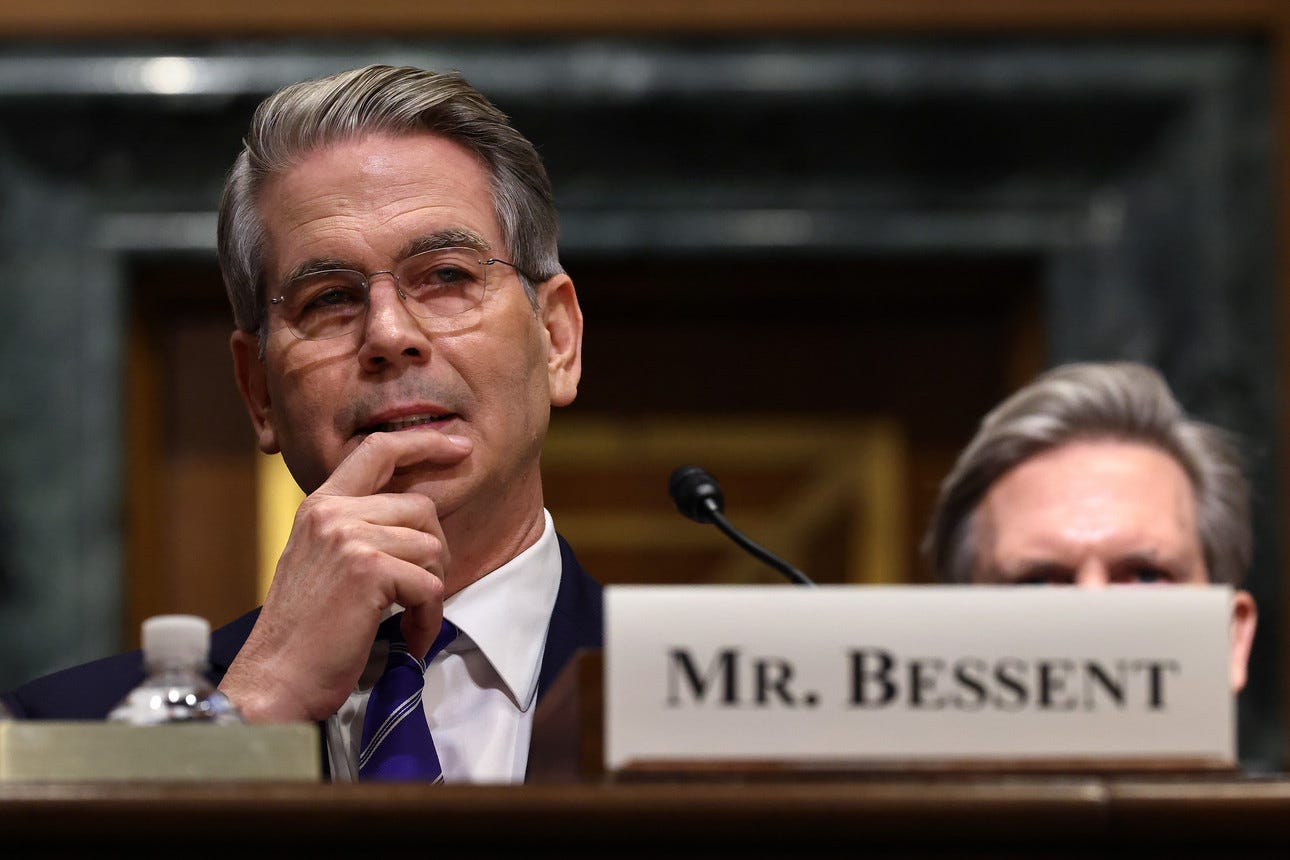Financial discipline comes for Washington
Capital is still weighing strategies, but we’re already paying the price
Well, it looks like we might be writing this a bit more often for a while now. This should take about five minutes to read. Please follow us on Twitter (we’ll be up on Bluesky soon), and share this with friends who might enjoy it.
Hypotheses only work if their authors admit when events have falsified them. Last week, we put out a piece built around a hypothesis that the highest levels of capital are okay with the end of the dollar’s dominance. Events since then have not quite disproven this hypothesis, but they have provided context that makes us doubt some of our own work.
Key to our idea then: “the relative quiet among people like Dimon, Goldman Sachs’ David Solomon, or Trump’s billionaire economic braintrust in Treasury Secretary Scott Bessent and Commerce Secretary Howard Lutnick,” which we believe “should provoke even more concern.”
The very day of our publication, Bessent broke his silence… behind closed doors. The secretary -- who is only worth about $500 million, another error of ours in calling him a billionaire -- told an elite group of the very capitalists in question that President Trump would soon be backing off his effective trade embargo against China. The next day, Trump confirmed this in a press conference, a notable act of contrition from a man who has led a long life of remorseless violence and evil-doing both personal and political. Apparently some businessmen got through to him as well -- adding a bit of credibility back to our hypothesis -- as executives from Walmart, Target, and Home Depot warned him that empty shelves were weeks away unless he changed tacks.
So it is possible that capital is still open to the idea of an epochal shift in the global currency regime -- and their gold holdings have appreciated sharply in anticipation of just such a change -- but they have also shown fear and hesitancy in the face of this risk. This is the definition of ambivalence in the classic sense: ambi-, as in ambidextrous -- both -- valence, as in feelings. We can update our hypothesis to say that we don’t really know how capital feels about such a change, in fact they don't seem to know how they feel yet. But there is a chance that they are open to it.
Another concept feels less hypothetical at this point: the notion that U.S. markets are becoming subject to the same sorts of financial discipline more plebian economies have always faced. If our column last week felt wrong-headed, even worse was one that we wrote back in January and never published guessing that this discipline would come from a fiscal crisis like the U.K.’s in 2022, the result -- we suspected -- of tax cut legislation provoking bond vigilantes into a selloff like in Britain before.
Imagining that this administration would be shaped by the normal course of legislative events feels quaint just 100 days later, but the core concept here -- that capital markets would shift in significant ways to force U.S. governance into a fiscal compliance unknown to the country for decades -- does feel validated. Trump felt his hand forced by an unprecedented move in the markets away from the dollar and U.S. Treasury bonds.
Suddenly the “risk-off” safe haven assets had become “risk-on,” and the president risked sparking a feedback loop: markets punish loose fiscal policy by selling off bonds, raising interest rates and making deficits even more costly, forcing yet another selloff. Markets hinted strongly at the fiscal crisis to come.
This marks a major change. Almost any other government in the world that ran deficits as large as the United States’ for as many decades as we have run them would have seen its currency washed out and its sovereign bonds in the bargain bin. But the United States issues the world’s reserve currency, creating a never-ending global demand for dollars and Treasury bonds, regardless of its fiscal policies. Never-ending, that is, until this month…
This question will define U.S. political economy in the near-term: should we see this month’s market moves as a warning shot to Trump that won’t pop up again until a new progressive administration needs to be brought to heel, or do we have an emerging new normal? Since its 2022 crisis, the U.K. offers a glimpse into what this new discipline means for an old empire: austerity and broad-based decline.
Capital has reasons to land on either side of this question, and as we noted last week, “people with the most wealth and power today will always favor maintaining the status quo, and most economic observers will scream ‘no,’ shouting alarms about such a radical change.” The front pages will be full of stories decrying Trump and warning about this risk, demanding a conservation of business as usual.
But what about the back pages of more obscure (more expensive) journals, and the private meetings that don’t get leaked to the press? Will the highest lords of capital in those spaces come to a different perspective, one that’s willing to burn down the village they’ve enjoyed in order to save their long-term power? Their choice will determine what kind of discipline Trump -- and the rest of us -- face.
We intend to watch closely to see which way they land so that we all may prepare for how to resist their power once and for all.
Disclaimer
Our only investment advice: Listen to IBCK.
Our email is experiencing difficulties. If you have any comments, leave them below!





